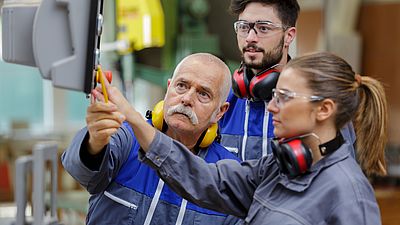Vocational training content
Engineers for sanitary, heating and air-conditioning systems lay the basis for fitting heating and air-conditioning systems as well as water pipes, sinks and toilets. This involves planning, building and maintaining pipes and connections.
At the beginning, trainees choose one of the following specialisations: water, ventilation, heating, environmental engineering or renewable energies. All trainees learn how to work with metal and plastics, i.e. drilling, screwing and welding techniques. This will not only enable them to maintain and repair systems, but also to give confident advice to customers. Upon completion of their vocational training, they will also be able to operate control systems and deal with system disruptions.
Special requirements
This vpocational training programme requires good numeracy skills because you will have to calculate material requirements and technical parameters. Drawing skills are also required because you will have to draw design plans. Additionally, you should also be able to deal with customers and focus on service.
Places of study
This is a dual vocational training programme. The theory is taught at a vocational school (Berufsschule), while practical training takes place at a craftsperson’s workshop or an industrial company.
Duration: 3.5 years
Remuneration corresponding to years of vocational training (craft business)
1st year €682–1,010
2nd year €805–1,115
3rd year €921–1,204
4th year €955–1,150
Remuneration corresponding to years of training (industry)
1st year €760–950
2nd year €825–1,020
3rd year €921–1,080
4th year €955–1,150
Remuneration (TVAöD): gross salary before tax and deductions for social security contributions; source: Federal Employment Agency (BA), as of January 2025.
Sector of activities
- Supply and installation
- Electrical installations
Your prospects after completion
- Employment at companies fitting sanitary, heating and air-conditioning systems
- Specialisation in e.g. quality assurance, customer service, maintenance or production
- Acquiring additional qualifications such as IT or foreign language skills
- Continuing vocational training to become a master craftsman or fully qualified engineer





